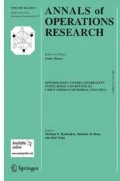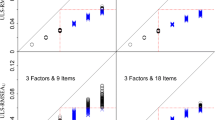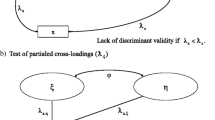Abstract
This paper discusses a class of modeling alternatives to regression or canonical correlation when dependent variables can be logically considered as outputs to be maximized. Likewise independent variables should be considered as constraints on resources which establish limits to the output levels. A total factor productivity/efficiency ratio of non-negatively weighted outputs divided by similarly weighted inputs is to be fitted to the data by the Maximum Decisional Efficiency Principle. It is assumed that such data, when obtained from experienced managers or viable organizations, should tend to exhibit purposeful rather than random behavior under appropriate parameter value choices and density assumptions. Some model quality improvement issues, analogous to those in regression theory, are also proposed (e.g. criterion choice, residual analysis, and outliers). Potential advantages of the approach are discussed for empirical studies in Information Technology and Production/Operations Management settings.
Similar content being viewed by others
References
P. Anderson and N.C. Peterson, A procedure for ranking efficient units in Data Envelopment Analysis, Management Science 39(1993)1261–1264.
E.H. Bowman, Consistency and optimality in managerial decision making, Management Science 9(1963)310–321.
W.D. Cook, M. Kress and L.M. Seiford, Prioritization models for frontier decision making units, European Journal of Operational Research 59(1992)319–323.
A. Charnes, W.W. Cooper and E. Rhodes, Evaluating program and managerial efficiency: Application of Data Envelopment Analysis to program follow through, Management Science 27(1981) 698–697.
A. Charnes, W.W. Cooper, A. Lewin and L.M. Seiford, Data Envelopment Analysis: Theory, Methodology and Applications, Kluwer Academic, Boston, 1995.
J.E. Falk and S.W. Palocsay, Optimizing the sum of linear fractional functions, in: Recent Advances in Global Optimization, C.A. Floudas and P.M. Pardalos, eds., 1992.
L.S. Lasdon, A.D. Waren, A. Jain and M. Ratner, Design and testing of a generalized reduced gradient code for nonlinear programming, ACM Transactions on Mathematical Software 4(1978) 34–50.
A. Madansky, Prescriptions for Working Statisticians, Springer, New York, 1988.
J. Neter, W. Wasserman and M.H. Kutner, Applied Linear Statistical Models, Richard D. Irwin, Homewood, IL, 1985.
I. Quesada and I.E. Grossmann, A global optimization algorithm for linear fractional and bilinear programs, Journal of Global Optimization 6(1995)39–76.
G.R. Reeves and J.R. Sweigart, Multiperiod resource allocation with variable technology, Management Science 28(1982)1441–1449.
Y. Roll, W. Cook and B. Golany, Controlling factor weights in Data Envelopment Analysis, IIE Transactions 23(1991)2–9.
M.D. Troutt, A maximum decisional efficiency estimation principle, Management Science 41(1995) 76–82.
M.D. Troutt, Derivation of the maximin efficiency ratio model from the maximum decisional efficiency estimation principle, Annals of Operations Research 73(1997)323–338.
M.D. Troutt, Linear programming envelopment of input-output data, Working Paper under publication review, Department of Management, Southern Illinois University, Carbondale, IL, 1996.
Rights and permissions
About this article
Cite this article
Troutt, M., Zhang, A., Tadisina, S. et al. Total factor efficiency/productivity ratio fitting as an alternative to regression and canonical correlation models for performance data. Annals of Operations Research 74, 289–304 (1997). https://doi.org/10.1023/A:1018982707338
Issue Date:
DOI: https://doi.org/10.1023/A:1018982707338




